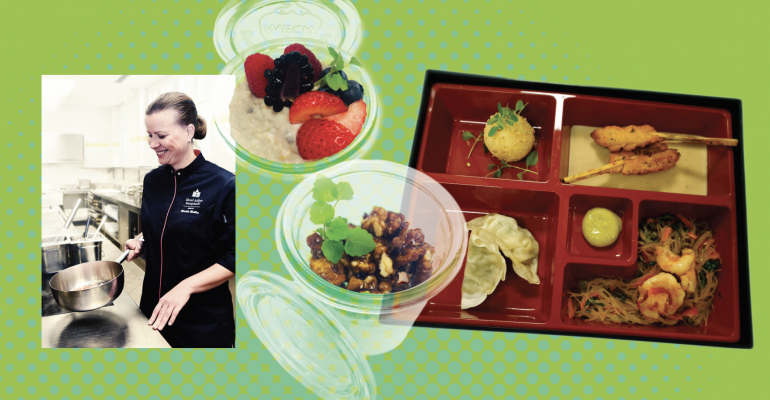The Hotel Adlon Kempinski Berlin has reopened for large group events while still adhering to Germany’s strict COVID-19 policies. Attendees are subject to social distancing rules and buffets are banned. Executive Sous Chef Michéle Müller (pictured right) describes how the hotel is managing to offer large-group catering without limiting menus and adopting safe and, frankly, adorable food presentation.
MeetingsNet: Have you had to limit or change menus because of restrictions on buffets and the risk of food contamination in large groups?
Müller: We didn’t want to say no to any menus people wanted, and we need to be able to do hot food for banquets, so we are using bento boxes. We can put four to five different items in the compartments and they don’t touch each other. That means we can serve a three-course meal in one box: a salad, a side, a main course, and a dessert. At our opening banquet, we served a noodle salad and grilled prawn, chicken Yakitori skewers with peanut sauce, and a mochi rice cake for dessert. It doesn’t have to be Asian food, traditional German dishes or any other specialty will work well.
MN: Do you have to prepare the food differently or allow more time for plating?
Müller: No, we plate “à la minute” so it is fresh, and the boxes actually keep the food the right temperature. The lids prevent any contamination when guests take their food. Each guest also has cutlery wrapped in cloth napkins to protect it.
MN: Is there anything you can’t serve in a bento box?
Müller: Just soup!
MN: How are you managing coffee breaks for large numbers of people?
Müller: We are using mason jars. They look good; the glass is strong, and guests can see what is inside them. You can buy them in many different sizes with glass lids, so we can put iced coffee in them, or a perfectly garnished piece of cake, so nothing is exposed as people walk by.
MN: How are you handling breakfasts while buffets are banned in Germany?
Müller: For me, breakfast is really, really important and we always want to do something special for guests. We can’t do a buffet with meats, cheeses, and smoked fish, but we want to serve everything in style. We are using tiny étagères [presentation shelves] for each table setting with just a small selection so there is no waste. We are still only allowed to seat people from one family together or just two people at a table so they can choose the table with the selection they would like to eat, and we can keep replenishing it or bring other items. We also have servers with a single portion of muesli or granola in mason jars, or a little pancake or waffle. Guests can eat as much as they want and experience all the different dishes, but each type of food is served in small quantities in separate jars to protect it from contamination. It is like a buffet but without the risk.
MN: How are you planning to keep diners five feet apart?
Müller: We have an event on Tuesday for more than 160 attendees, but we have split them into two groups of 80. Everything will be cleaned and reset in between each group.
MN: Has the change in food service set back your sustainability efforts?
Müller: Waste has become a huge problem during the coronavirus [outbreak] but our bento boxes are made of plastic and are sustainable because we wash and reuse. The same with the mason jars. We are not making waste.
Further Reading on Reimagining F&B During the Pandemic: Food (& Beverage) for Thought





